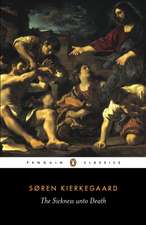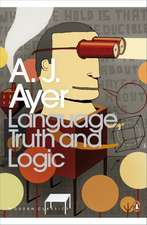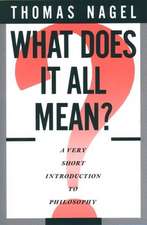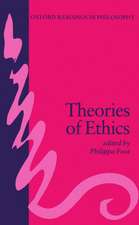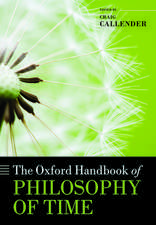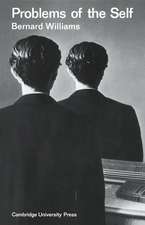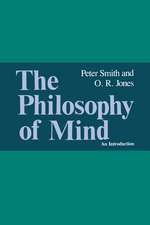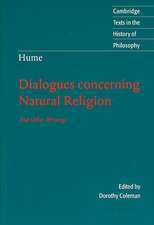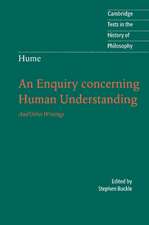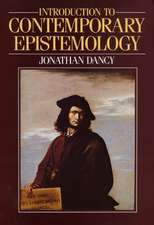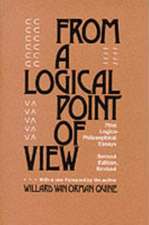Plato: Complete Works
Autor Plato Editat de John M. Cooper, D. S. Hutchinsonen Limba Engleză Hardback – mai 1997
Preț: 419.45 lei
Preț vechi: 505.46 lei
-17% Nou
Puncte Express: 629
Preț estimativ în valută:
80.27€ • 83.50$ • 66.27£
80.27€ • 83.50$ • 66.27£
Carte disponibilă
Livrare economică 24 martie-07 aprilie
Livrare express 07-13 martie pentru 80.20 lei
Preluare comenzi: 021 569.72.76
Specificații
ISBN-13: 9780872203495
ISBN-10: 0872203492
Pagini: 1838
Ilustrații: notes, index
Dimensiuni: 95 x 234 x 56 mm
Greutate: 1.49 kg
Editura: Hackett Publishing Company
Colecția Hackett Publishing Company, Inc (US)
ISBN-10: 0872203492
Pagini: 1838
Ilustrații: notes, index
Dimensiuni: 95 x 234 x 56 mm
Greutate: 1.49 kg
Editura: Hackett Publishing Company
Colecția Hackett Publishing Company, Inc (US)
Recenzii
This is clearly the definitive edition in English of the Platonic writings. It replaces completely the Hamilton-Cairns collection. . . . The notes are at just the right level, and the index is very helpful. The translations are both readable and accurate. They are always reliable, and in most cases the best available. It is the one volume of Plato every student of philosophy will want at her or his side. --Michael D. Rohr, Rutgers University
The most important publishing event in Platonic translation is the Complete Works edited by Cooper and Hutchinson. . . . Hackett has lavished great care in the production of this volume: fine India paper, elegant typography, sewn binding, and cloth boards. . . . It should be in every library and on the shelves of all lovers of Plato. --Steven J. Willett, Syllecta Classica
The edition is a vast improvement over the Princeton/Bollingen edition, the former standard. Congratulations on a fine work! --Christian K. Edemeyer, Columbia University
The most important publishing event in Platonic translation is the Complete Works edited by Cooper and Hutchinson. . . . Hackett has lavished great care in the production of this volume: fine India paper, elegant typography, sewn binding, and cloth boards. . . . It should be in every library and on the shelves of all lovers of Plato. --Steven J. Willett, Syllecta Classica
The edition is a vast improvement over the Princeton/Bollingen edition, the former standard. Congratulations on a fine work! --Christian K. Edemeyer, Columbia University
Descriere
Descriere de la o altă ediție sau format:
The second edition of Five Dialogues presents G. M. A. Grube's distinguished translations, as revised by John Cooper for Plato, Complete Works . A number of new or expanded footnotes are also included along with an updated bibliography.
Cuprins
Preface; Abbreviations; Introduction; Part I. Prolegomena to the Dialogue: 1. Introduction; 2. Summary and analysis of composition; 3. Is the Clitophon unfinished?; 4. The Clitophon as a Short Dialogue; 5. The characters of the dialogue; Part II. Meaning and Authenticity: 6. Philosophical protreptic in the fourth century BCE; 7. Protreptic in the Clitophon; 8. Protreptic in Plato; 9. Elenchos in the Clitophon; 10. Justice in the Clitophon; 11. The meaning of the Clitophon; 12. Date and authenticity; Text and translation; Commentary; Appendices: I. The ending of Aristotle's Protrepticus; II. Note on the text; Bibliography; Indexes.
Notă biografică
Plato was an ancient Greek philosopher born in Athens during the Classical period in Ancient Greece. In Athens, Plato founded the Academy, a philosophical school where he taught the philosophical doctrines that would later become known as Platonism. Plato (or Platon) was a pen name derived, apparently, from the nickname given to him by his wrestling coach - allegedly a reference to his physical broadness. According to Alexander of Miletus quoted by Diogenes of Sinope his actual name was Aristocles, son of Ariston, of the deme Collytus (Collytus being a district of Athens).[2]Plato was an innovator of the written dialogue and dialectic forms in philosophy. He raised problems for what later became all the major areas of both theoretical philosophy and practical philosophy. His most famous contribution is the Theory of forms, which has been interpreted as advancing a solution to what is now known as the problem of universals. He is also the namesake of Platonic love and the Platonic solids.His own most decisive philosophical influences are usually thought to have been, along with Socrates, the pre-Socratics Pythagoras, Heraclitus, and Parmenides, although few of his predecessors' works remain extant and much of what we know about these figures today derives from Plato himself.[a]Along with his teacher, Socrates, and his student, Aristotle, Plato is a central figure in the history of philosophy.[b] Unlike the work of nearly all of his contemporaries, Plato's entire body of work is believed to have survived intact for over 2,400 years.[6] Although their popularity has fluctuated, Plato's works have consistently been read and studied.[7] Through Neoplatonism Plato also greatly influenced both Christian and Islamic philosophy (through e.g. Al-Farabi). In modern times, Alfred North Whitehead famously said: "the safest general characterization of the European philosophical tradition is that it consists of a series of footnotes to Plato
Caracteristici
Concludes that justice, self-control (sophrosyne), and virtue (arete) are 'natural'; the city which displays them is most truly free; the individuals who possess them will achieve their true destiny.

